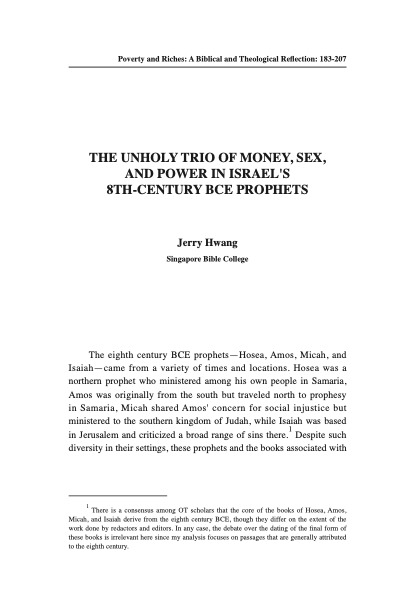THE UNHOLY TRIO OF MONEY, SEX, AND POWER IN ISRAEL'S 8TH-CENTURY BCE PROPHETS/Jerry Hwang
Jerry Hwang Assistant Professor, Singapore Bible College
ABSTRACT
This article examines the historical and literary interconnections among idolatry, injustice, and immorality in several eighth century BCE prophetic books: Isaiah, Hosea, Amos, and Micah. A social analysis of the eighth century prophets reveals that Baal worship and other forms of Canaanite fertility religion carried significant economic and ethical implications. Any discussion of economics and ethics must therefore take Israel’s idolatrous worship into account. The interconnections among the “unholy trio” of idolatry, injustice, and immorality became entrenched in the aftermath of the socioeconomic reforms begun by David and Solomon in the tenth century BCE. By the prosperous times of the eighth century, there existed a widening gap between rich and poor due to the consolidation of land and power in the hands of the agrarian elite (Am 2:7; 5:11; Isa 3:14-15; 5:8-10; Mic 2:1–2, 9).
This paper also offers a constructive engagement with Walter Wink and Jacques Ellul, two scholars who have attempted to reframe the Old Testament’s descriptions of idolatry, injustice, and idolatry in the modern categories of money, sex, and power. Though the proposals of Wink and Ellul are found wanting in certain respects, the need for socially informed interpretations of the eighth century prophets persists today. The phenomenon of globalization means that the unholy trio of idolatry, injustice, and immorality continue to cluster together in contemporary society and must be combatted by confronting sin in its systemic manifestations, as modeled for us by the eighth century prophets.
撮要
本文探討了偶像崇拜,社會不公以及道德墮落三者在主前八世紀的先知書中所呈現的歷史和文學關聯,這些書卷包括以賽亞書、何西阿書、阿摩司書和彌迦書。從社會角度分析主前八世紀的先知書,揭示了巴力崇拜和其他形式的迦南生殖崇拜有着顯著的經濟和倫理功能。因此,任何對於經濟和倫理的探討必須同時對以色列的偶像崇拜加以研究。而偶像崇拜、社會不公以及道德墮落三者的關聯成為了在主前十世紀大衛和所羅門社會經濟改革後仍然遺留下來的問題。直到主前八世紀的繁榮時期,由於農業精英手中的土地和權力得到鞏 固,貧富差距不斷加大。(摩二7,五11;賽三14∼15,五8∼10;彌二1∼2、 9)
本文也與溫克(Walter Wink)以及依路(Jacques Ellul)有建設性的互 動,這兩位學者嘗試將舊約中對偶像崇拜和社會不公的描述用金錢、性和權力 這些當代範疇重新構建。雖然溫克和依路提出的詮釋在一些方面有待完善,但 今天仍然有需要從社會的角度對主前八世紀的先知書進行詮釋。全球化現象代 表着偶像崇拜、社會不公和道德墮落這三者集中體現在當代社會中,正如主前 八世紀先知書中的示範,我們所對抗的必須是罪有系統的表現形態。
原載於《建道學刊》41期(2014),頁 183-208。
最新文章
新手牧者研究計劃(三):新手牧者的身心靈狀態 / 盧慧儀
2025 年 11 月 19 日
【教牧退休】好好理財 退而不憂 / 林本利
2025 年 10 月 1 日
【教牧退休】生前身後的管理:平安三寶 / 陸文慧
2025 年 10 月 1 日
編輯精選
[電子書]困境與抉擇:「建道研究中心30週年誌慶」跨學科研討會論文集/廖炳堂、倪步曉主編
2025 年 1 月 2 日
從梧州到長洲:建道神學院125年的挑戰與恩典 / 陳智衡
2023 年 10 月 1 日
微小教會的見證/高銘謙
2023 年 6 月 1 日







